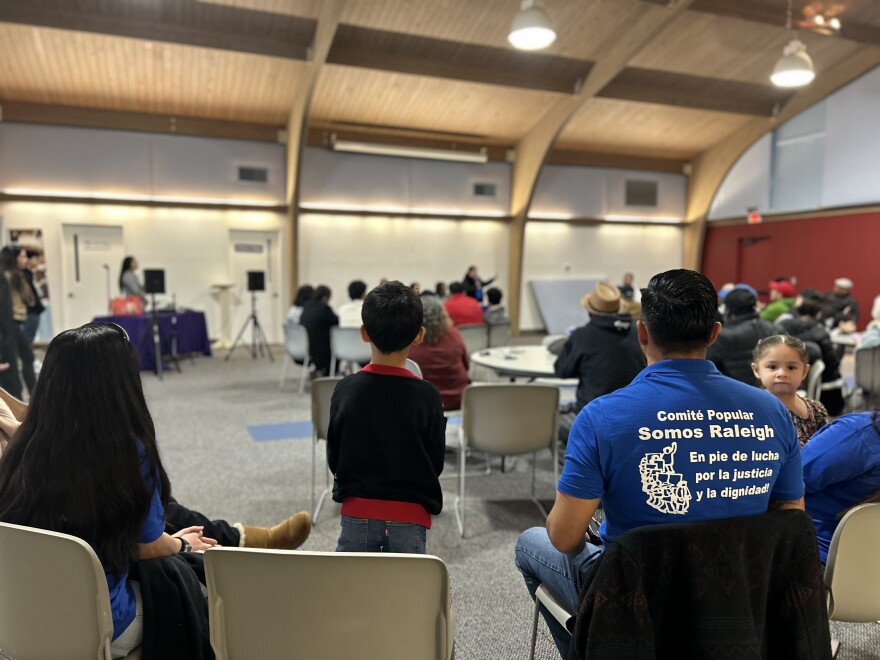Networks of Latino organizations and grassroots groups have organized in recent months to prepare thousands of immigrants without legal status and their families in North Carolina for a new era of immigration crackdowns promised by President Donald Trump.
People are spreading word of activist-run hotlines to report Immigration and Customs Enforcement sightings, share advice from immigration attorneys, and spread information on know-your-rights workshops — some of them held clandestinely due to heightened fears.
These groups, including nonprofits, local activists, and immigration attorneys, began to plan and strategize well before President Trump took office on Jan. 20.
"We know that the undocumented immigrant community is the most at risk," said Ivan Almonte, a longtime immigrant organizer and director of Durham Rapid Response. "We're mobilizing the community across the state. It's important to be part of a group of community organizers because each county, each city, is different."
There are approximately 325,000 people without legal status in North Carolina, according to the Office and State Budget and Management. The vast majority are Hispanic and have worked in the agriculture, construction, and service industries for years, establishing families and strong communities.
Almonte created a new immigrant support line with Durham Rapid Response, or , where people can call or text the line for information or to get help related to deportation concerns.
Almonte teamed up with other Triangle grassroots groups to pool resources and make it easier to communicate. Among them is the Raleigh-based Comité Acción Popular. That group runs a separate immigrant support line called RadarSafe, which was established during the first Trump administration to report ICE sightings and police checkpoints.
Similar community alert systems are also being operated by Carolina Migrant Network in Charlotte and Siembra NC across several different counties. Some have have already started to field calls from concerned residents.

The day before Trump’s inauguration, Durham Rapid Response hosted a bilingual forum where a several dozen people heard from local grassroots groups, an immigration attorney, and a supportive law enforcement official, Durham County Sheriff Clarence Birkhead.
"We’re not going to stop you and ask for your immigration status," said Birkhead. "We’re not going to stop you and ask for your papers. From my (jail), ICE has not come to pick up anyone."
Birkhead reiterated he doesn’t cooperate with federal immigration detainer requests.
That means Immigration and Customs Enforcement officials need to obtain a judicial order instead of a typical administrative warrant to take migrants charged with serious crimes in Durham’s jail into federal custody.
The Sheriff did note, however, that ICE can wait outside of the Durham Detention Center to detain a person who has been released by the jail after posting bond or seeing a judge.
The state legislature passed House Bill 10 last year requiring all county sheriffs in the state to obey ICE detainer requests. However, Sheriff Birkhead told ����app that the law hasn't changed ICE's requirement of a judicial order to detain migrants being held by the jail.
����app published a Q&A on House Bill 10 before it was signed into law.
The Sheriffs of North Carolina’s most populous counties — like Wake, Guilford, and Mecklenburg — have previously not honored those detainer requests either.
Earlier this week, the Trump administration said they want to crack down on this. The Justice Department ordered prosecutors to investigate and potentially charge local and state law enforcement agencies that don’t cooperate with federal immigration directives.
Before Jan. 20, Durham immigration attorney Yesenia Polanco said her law firm has been "cleaning house" by getting as many appointments and cases taken care of in anticipation of issues and obstacles from the new administration.
"My team is working really hard, finishing packets, finishing applications, collecting supporting documents and getting them filed to the government, to USCIS, in preparation for what may come," said Polanco.
Polanco said other families have drafted powers of attorney to ensure the well-being of their children in case they're separated.
Others have headed to the Mexican consulate in Raleigh to attempt to secure passports and dual citizenship for their children.
Nikki Marin-Baena, co-director of the Triad-based immigrant advocacy organization Siembra, said the group is preparing for the type of enforcement the state saw in early 2019 when hundreds of people were detained by immigration agents.
"What we experienced was in 2018 and 2019, ICE agents were just kind of arresting whoever they ran into that they could kind of have a sense was not born in the U.S.," Marin-Baena said.
Siembra is hosting "ICE Watch" training sessions on how to dispel rumors and verify reports of immigration agent sightings.
"One of the main priorities of the Trump administration is to encourage self-deportation," said Marin-Baena. "Creating such an environment of panic that people will want to leave on their own. What's really important about ICE verification is controlling rumors in the community."
Marin-Baena said these trainings will help dispel rumors of ICE sightings, which historically have been false more often than not. Such rumors can spread false information, resulting in people being afraid to go to work or take their children to school.
The Trump administration’s proposed crackdowns are targeting so-called sanctuary cities with less restrain than in Joe Biden's administration. Immigration agents like schools, churches, and healthcare facilities for their operations, according to a new directive.
Despite this, church congregations like Immaculate Conception Catholic Church in downtown Durham are responding to the needs of their congregation, which is two-thirds Latino.
"Many of our brothers and sisters in the Latino community are undocumented, they're families with children born in the United States," said Gonzalo Torres, a friar and parochial vicar. "They is a fear in the community. We are trying to do our best to be there for them."







